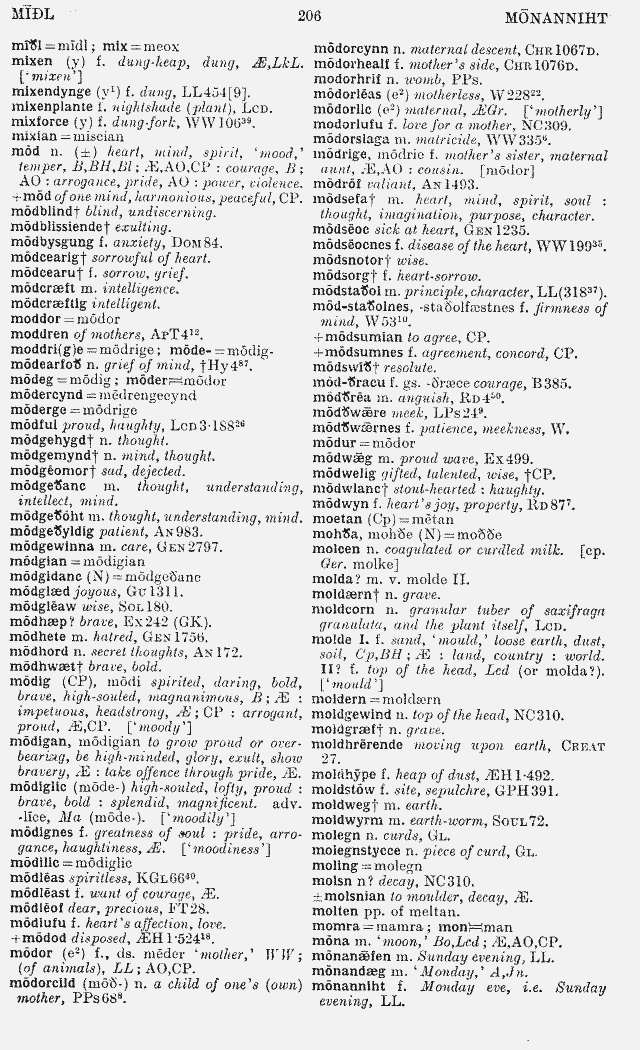古英語の語形成 (word formation) が,派生 (derivation) や複合 (compounding) により,著しく豊かであることは,古英語の文法書や英語史の概説書を通じてよく知られている.Baugh and Cable (64--65) では,印象的な例として,古英語 mōd "mood, heart, mind, spirit; boldness, courage, pride, haughtiness" という1つの語根から,100以上の語が形成されるという事実が紹介されている.100個とまではいかないが,そこで挙げられている語を,意味とともに列挙してみよう.
・ mōdig "spirited, bold, high-minded, arrogant, stiff-necked"
・ mōdiglic "magnanimous"
・ mōdiglīce "boldly; proudly"
・ mōdignes "magnanimity; pride"
・ mōdigian "to bear oneself proudly or exultantly; to be indignant, to rage"
・ gemōdod "disposed; minded"
・ mōdfull "haughty"
・ mōdlēas "spiritless"
・ mōdsefa "mind, thought, understanding"
・ mōdgeþanc "mind, thought, understanding"
・ mōdgeþoht "mind, thought, understanding"
・ mōdgehygd "mind, thought, understanding"
・ mōdgemynd "mind, thought, understanding"
・ mōdhord "mind, thought, understanding"
・ mōdcræft "intelligence"
・ mōdcræftig "intelligent"
・ glædmōdnes "kindness"
・ mōdlufu "affection"
・ unmōd "despondency"
・ mōdcaru "sorrow"
・ mōdlēast "want of courage"
・ mādmōd "folly"
・ ofermōd "pride"
・ ofermōdigung "pride"
・ ofermōdig "proud"
・ hēahmōd "proud; noble"
・ mōdhete "hate"
・ micelmōd "magnanimous"
・ swīþmōd "great of soul"
・ stīþmōd "resolute; obstinate"
・ gūþmōd "warlike"
・ torhtmōd "glorious"
・ mōdlēof "beloved"
Hall の古英語辞書(第2版)で mōdig 周辺をのぞくと,ほかにも関連語のあることがわかる.

確かに古英語の語形成の "resourcefulness" には驚く.複合に関しては,その延長線上に kenning という文飾的技巧のあることを指摘しておこう.
ただし,この "resourcefulness" が古英語の共時的な生産性を表わすものかどうかという点については熟慮を要する.[2011-05-28-1]の記事「#761. 古英語の derivation は死んでいたか」で考察したように,この "resourcefulness" は,古英語以前からの通時的な派生・複合の結果が累々と蓄積され,豊かな語彙ネットワークとして古英語に共時的に現われているということではないか.synchronic productivity と diachronic productivity とを分けて考える必要があるのではないか.
・ Baugh, Albert C. and Thomas Cable. A History of the English Language. 5th ed. London: Routledge, 2002.
・ Hall, John Richard Clark, ed. A Concise Anglo-Saxon Dictionary. 2nd ed. New York: Macmillan, 1916.